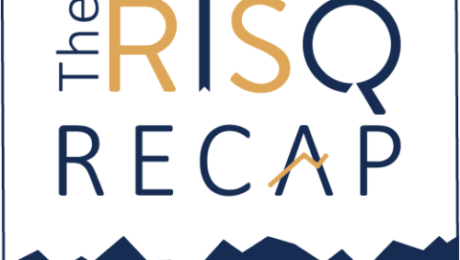The RISQ RECAP:
January 8th – January 12th, 2024
Each week, you’ll find specially curated news articles to keep you up to date on the ever-evolving world of insurance and risk management. The articles are divided out between items relevant to Property & Casualty, Employee Benefits/Human Resources, and Compliance. We’ve included brief summaries of each item as well as a link to the original articles.

PROPERTY & CASUALTY
Viewpoint: Cyber Insurance Market Themes to Look Out for in 2024 “After my (relatively) successful effort in looking at 2023 cyber insurance themes, like a gambler on a streak of beginner’s luck, I wanted to have another roll of the dice in offering my thoughts on cyber insurance themes to look out for in 2024. As a hostage to my future self, the beginning of another new year is a good opportunity to set out what could be the dominant themes of the cyber insurance market as it continues to rapidly evolve and grow.” Full Article – Insurance Journal
Airlines Cleared to Inspect Grounded Boeing Jets After Mid-Air Incident “A delay in the inspection of grounded Boeing jets ended on Monday after U.S. officials retrieved a panel that blew off an Alaska Airlines 737 MAX 9 airliner and shares in the planemaker sagged on concerns over the troubled jet program. The U.S. Federal Aviation Administration has ordered the temporary grounding for checks of 171 MAX 9 jets installed with the same kind of panel that fell from the jet on Friday, which weighs about 60 pounds (27 kg) and covers an optional exit door.” Full Article – Insurance Journal

EMPLOYEE BENEFITS, HUMAN RESOURCES, & COMPLIANCE
When Will the Ball Drop? Still Waiting on the PWFA Final Regulations “We rang in the new year waiting and watching for the issuance of the EEOC’s final regulations implementing the Pregnant Workers Fairness Act (PWFA). The Office of Information and Regulatory Affairs (OIRA) received the text of the final regulations for review on December 27. Assuming that the EEOC’s final regulations clear this review, we expect the regulations to be published in the Federal Register soon.” Full Article – Jackson Lewis P.C.
NLRB Seeks to Force Reopening of Shuttered Starbucks Cafes “One of the more harsh remedies at the National Labor Relations Board’s (NLRB) disposal is forcing companies to reopen shuttered locations in the event the agency determines the decision to close those sites was driven by anti-union considerations. In the wake of the ongoing nationwide union drive at Starbucks, the coffee giant now is facing such a case.” Full Article – Barnes & Thornburg LLP
Federal and State Authorities Bring Antitrust Enforcement to the Contingent Workforce Sector Employers—Be Careful with Those Mandatory EAP Referrals! “The U.S. Department of Justice (DOJ), Federal Trade Commission (FTC), and now state attorneys general, have set their sights on staffing companies in their evolving efforts to examine labor markets through an antitrust lens. In recent years, government agencies have stepped up efforts targeting perceived restraints on competition in the labor markets.” Full Article – Littler Mendelson P.C.
Eleventh Circuit Deepens Circuit Split Over Causation Standard for FMLA Retaliation Claims “On December 13, 2023, an Eleventh Circuit panel firmly established “but-for” causation as the Circuit’s causation standard for Family and Medical Leave Act (FMLA) retaliation claims. Courts across the nation have adopted different standards, with the Eleventh Circuit decision only further deepening the circuit split on the topic.” Full Article – Proskauer Rose LLP
Court Rules EEO-1 Reports Are Not Exempt “Commercial” “Many federal contractors and subcontractors treat their EEO-1 reports as confidential because they contain detailed demographic data and workforce information. A lawsuit brought by the Center for Investigative Reporting and reporter Will Evans seeks to force a mass disclosure of EEO-1 Reports by the OFCCP. The litigation reached a critical juncture recently when a federal judge in California ruled that EEO-1 Reports are not protected from disclosure under “Exemption 4” of the Freedom of Information Act, which protects confidential “commercial” information” Full Article – Seyfarth Shaw LLP
Information Under FOIA; Department of Labor May Appeal

STATE & INTERNATIONAL COMPLIANCE
In addition to the RISQ Review, RISQ Consulting also provides a resource that features changes and updates to State and International Compliance measures. We’ve included brief summaries of each item below, and also provided links to the original articles if you’d like to read further.
MASSACHUSETTS
Massachusetts Revises Paid Family and Medical Leave Guidance to Provide More Discretion to Employers
“The Massachusetts Department of Family and Medical Leave (DFML) is ringing in the new year with new, more employer-friendly guidance regarding an employee’s ability to use paid leave to “top up” Paid Family and Medical Leave (PFML) benefits paid by the Commonwealth of Massachusetts.” Full Article
– Littler Mendelson P.C.
NEW JERSEY
New Jersey’s Minimum Wage Increases Starting January 1, 2024
“New Jersey’s new mandatory minimum wage requirement will be effective January 1, 2024. For most employers, the 2024 minimum wage for compensating employees will be $15.13 per hour (up from $14.13 per hour in 2023).” Full Article
– Saiber LLC
NEW YORK
New York Governor Vetoes Legislation Prohibiting Noncompete Agreements
“On December 22, 2023, Governor Kathy Hochul vetoed a bill that would have prohibited almost all noncompete agreements in employment contracts in New York.” Full Article
– Duane Morris LLP
MARYLAND
Maryland Minimum Wage Increases January 1, 2024
“Maryland employees who earn minimum wage are ringing in the New Year in 2024 with a raise. As we reported in an earlier article, Maryland passed legislation in 2019 that would gradually increase the minimum wage from $11.00 per hour to $15 per hour by January 1, 2025. In May 2023, however, the General Assembly passed the Fair Wage Act of 2023, accelerating the schedule so that the minimum wage will now be $15 effective on January 1, 2024.” Full Article
– Gordon Feinblatt LLC
CALIFORNIA
Ring In 2024 With California’s Updated Paid Sick Leave FAQs!
“Out with the old, and ring in the new! Effective January 1, 2024, California’s amended Paid Sick Leave (“PSL”) law goes into effect. As detailed in our prior update, the amendments increase the annual amount of California paid sick leave from 3 days or 24 hours, to the greater of 5 days or 40 hours for eligible employees. The amendments also raise the accrual and year-end carryover cap from 6 days or 48 hours to the greater of 10 days or 80 hours.” Full Article
– Seyfarth Shaw LLP
- Published in Blog
8 Tips for Modernizing Hiring in 2024
This article is from RISQ Consulting’s Zywave client portal, a resource available to all RISQ Consulting clients. Please contact your Benefits Consultant or Account Executive for more information or for help setting up your own login.

As talent acquisition continues to evolve, staying ahead of the curve is crucial for organizations aiming to attract and retain top-tier talent. Last year highlighted labor shortages, looming retirements and a demand for evolving skills. As 2024 begins, the traditional hiring approaches are being reshaped by technology, remote work dynamics and shifting employee expectations.
This article explores strategies for employers to modernize their hiring practices in 2024.
Navigating the Future of Hiring
Modernizing hiring practices enhances an organization’s ability to attract, recruit and retain top talent in a competitive environment. As job seeker’s expectations shift and many leverage technology to find their next job, employers can consider these eight tips for modernizing their hiring process this year:
- Evaluate diversity, equity, inclusion and belonging (DEIB). DEIB programs are increasingly shifting to support the acceptance of individuals and focus on fostering a sense of belonging in the workplace. A diverse and inclusive hiring strategy—and overall employer brand—can help attract candidates. To be impactful, DEIB has to be a part of an organization’s foundation, including hiring practices—not just initiatives or programs.
- Emphasize skills over educational degrees. Skills-based hiring isn’t just an aspirational idea; some employers are already taking note and prioritizing finding the right fit for open positions based on skills rather than education or experience. Organizations can take time to review which positions have a legitimate need for a four-year degree or certification and which ones need the appropriate skills. This hiring practice can help expand the talent pool, improve workplace diversity and decrease hiring time.
- Embrace artificial intelligence (AI). Employers can leverage the power of AI to streamline their hiring process. AI-driven tools can analyze resumes, assess candidate fit and even conduct initial interviews. By automating routine tasks, HR professionals can focus on strategic aspects of recruitment, fostering a more efficient and insightful hiring process. AI can also help personalize candidate engagement by sending tailored messages and recommended or relevant job openings. While AI has its advantages, it’s also important to be aware of the technology’s risks and dangers (e.g., bias and discrimination).
- Leverage data-driven decision-making. Employers can harness the power of people analytics to inform their hiring decisions. Analyze recruitment data to identify trends, optimize sourcing strategies and enhance the candidate experience. By leveraging data-driven insights, hiring teams can make informed decisions that better contribute to the overall success of their hiring efforts.
- Incorporate gamification into skills assessment processes. Gamified assessments provide a more engaging and interactive experience for candidates, allowing hiring teams to assess candidate skills in a dynamic and real-world context. This can enhance the evaluation process and showcase the organization as forward-thinking and innovative.
- Enhance the candidate experience with technology. Technology can help streamline communication, provide timely feedback and offer transparency throughout the hiring process. A positive candidate experience not only attracts top talent but also enhances the employer brand, creating a ripple effect in the talent market.
- Leverage the right online portals. Virtual recruiting can help employers find the applicants they’re looking for. Furthermore, online platforms—such as LinkedIn, Indeed, Handshake and more—can make it easy for applicants to apply directly.
- Offer incentives with employee referral programs. Employers can empower their current employees to become brand ambassadors. Millennial and Generation Z candidates generally trust and value word-of-mouth referrals, whether for employment or shopping, so employers could amp up referral efforts to attract this demographic. Employee referral program incentives aren’t new, but they can be modernized to appeal to millennial and Generation Z candidates. As such, employers may consider offering monetary bonuses, paid time off, learning and development opportunities (e.g., covering the cost of attending a conference or training), or charity donations that may motivate younger workers.
While maybe not applicable to every open role, these strategies can give employers new tools to revamp their hiring processes. It comes down to building a competitive advantage to stand out to job candidates.
Summary
As the digital age progresses, staying ahead of the latest HR trends and technologies is imperative for modernizing the hiring process. By embracing AI and other technologies, prioritizing DEIB and leveraging data-driven insights, employers can attract top talent in 2024 and build a future-ready workforce.
Contact us today for more workplace guidance.
- Published in Blog
The RISQ RECAP:
December 18th – December 22nd, 2023
Each week, you’ll find specially curated news articles to keep you up to date on the ever-evolving world of insurance and risk management. The articles are divided out between items relevant to Property & Casualty, Employee Benefits/Human Resources, and Compliance. We’ve included brief summaries of each item as well as a link to the original articles.

PROPERTY & CASUALTY
Companies Are Still Trying to Figure Out How to Comply With SEC Cyber Rules “Some public companies are still trying to figure out how to comply with new rules from the US Securities and Exchange Commission requiring speedy disclosure of significant cyberattacks. Those rules, which kicked in Monday, require companies to report cyber incidents within four business days of determiningthey are “material” to shareholders. The SEC previously required firms to disclose major events that would be of shareholder interest, but didn’t specify cyber events.” Full Article – Insurance Journal
Flooding Drives Millions to Move as Climate Migration Patterns Emerge “Flooding is driving millions of people to move out of their homes, limiting growth in some prospering communities and accelerating the decline of others, according to a new study that details how climate change and flooding are transforming where Americans live. In the first two decades of the 21st century, the threat of flooding convinced more than 7 million people to avoid risky areas or abandon places that were risky, according to a paper Monday in the journal Nature Communications and research by the risk analysis organization First Street Foundation.” Full Article – Insurance Journal

EMPLOYEE BENEFITS, HUMAN RESOURCES, & COMPLIANCE
Health & Welfare Benefits Monthly Update, December 2023 (PDF) “Topics: [1] Year-end Washington update; [2] End of the Public Health and National Emergencies and Outbreak Period; [3] Developments in prescription drug coverage; [4] CAA, 2021 Updates: TiC and IDR; [5] Preventive services developments; [6] HIPAA developments; [7] 2023 Mental Health Parity proposed regulations; and [8] Grab bag report and reminders.” Full Article – Alston & Bird
Data Theft Was Not Necessarily “Gross Misconduct” That Would Preclude COBRA Coverage (PDF) “The court acknowledged that prior case law has established that criminal theft indisputably constitutes gross misconduct but noted that the former employees had not admitted to stealing the data and the city had not offered admissible evidence proving the employees’ actions.” Full Article – Thomson Reuters / EBIA
The ERISA Edit: More Litigation Involving Health Plan Savings Fees “This case is one of a growing number of lawsuits alleging improper self-dealing by third-party administrators (TPAs) for charging ‘savings fees’ to self-funded plans based on alleged savings achieved for the plans through the TPAs’ processing of out-of-network claims.” Full Article – Miller & Chevalier Chartered
Participant May Sue Plan for Facial Feminization Surgery Coverage “The court determined that the participant had presented facts sufficient to show that the plan had applied its cosmetic procedure exclusion in a discriminatory manner. It explained that the facts alleged by the participant show that the plan’s denial of coverage for the surgery was based, at least in part, on considerations of gender stereotypes and gender conformity or nonconformity.” Full Article – The Wagner Law Group
Signed, Sealed, Delivered … Have You Completed Your Plan’s “No Gag Clauses” Attestation? “All group health plans, whether fully insured or self-insured, are required to submit an attestation to CMS confirming that the plan has been compliant with the prohibition on gag clauses since December 27, 2020. This must be completed by December 31, 2023, and annually thereafter. Plans are permitted to contract with their TPA or carrier to complete the gag clause reporting on behalf of the plan.” Full Article – Holland & Hart LLP
Continuation of Health Benefits on Unpaid Leaves Can Cause Stop Loss Coverage Headaches “Unless the employer wants to modify its handbook and plan documents (and for self- funded plans, stop loss coverage) to provide continued active coverage during an unpaid leave, the employer instead should consider categorizing the coverage during the unpaid leave as COBRA coverage. Failure to do so could result in the stop loss carrier or insurance company denying claims during the period of the unpaid leave, as the employee was not actively at work, on a protected leave, or on COBRA.” Full Article – Haynes and Boone, LLP

STATE & INTERNATIONAL COMPLIANCE
In addition to the RISQ Review, RISQ Consulting also provides a resource that features changes and updates to State and International Compliance measures. We’ve included brief summaries of each item below, and also provided links to the original articles if you’d like to read further.
ILLINOIS
Not to be Outdone by the State of Illinois, Chicago Passes A New Paid Leave Ordinance, Which Doubles the Amount of Paid Leave Available to Eligible Employees
“On November 9, 2023, the City of Chicago passed its Chicago Paid Leave and Paid Sick and Safe Leave Ordinance (“Ordinance”), which goes into effect on December 31, 2023, and replaces the City’s current PSL Ordinance.” Full Article
– Michael Best & Friedrich LLP
NEW YORK
New York Governor Hochul Rejects Wholesale Ban on Non-Compete Agreements
“Governor Kathy Hochul answered the long-awaited question of whether New York would join California, North Dakota, Oklahoma and, most recently Minnesota, as a state banning the use of non-compete agreements between employers and employees. While New York legislators passed a bill to do just that in June, yesterday, Governor Hochul announced that she would not be signing it.” Full Article
– Seyfarth Shaw LLP
ALABAMA
New Alabama Law Exempts 2024 Overtime Pay from State Taxation
“Beginning Jan. 1, 2024, hourly paid employees in Alabama will not pay any state income tax on their overtime pay. The new law effectively gives hourly employees a 5% pay raise (the state income tax rate), but it also creates new administrative and reporting requirements for their employers.” Full Article
– Phelps Dunbar LLP
CALIFORNIA
California Employees Entitled to up to 20 Days of Reproductive Loss Leave
“California employers with five or more employees must provide to employees who have worked for at least 30 days before the start of leave up to five days per event for each of the following reproductive loss events: miscarriage; failed adoption; failed surrogacy; stillbirth; and unsuccessful assisted reproduction (artificial insemination including gamete and embryo donation).” Full Article
– Gordon Rees Scully Mansukhani LLP
MASSACHUSETTS
Massachusetts PFML Update: DFML Releases 2024 Poster and Updated Employee Notices
“The 2024 poster and updated template notice forms are now available on the Department of Family and Medical Leave’s (DFML’s) website. The DFML has also updated the PFML notice employers must provide to new employees to address the recent amendments to the PFML Act.” Full Article
– Seyfarth Shaw LLP
- Published in Blog
U.S. Justice Dept. Offers Guidance for Delayed Reporting Under SEC Cyber Rules
This article is from RISQ Consulting’s Zywave client portal, a resource available to all RISQ Consulting clients. Please contact your Benefits Consultant or Account Executive for more information or for help setting up your own login.

With the Dec. 18 effective date of the U.S. Securities and Exchange Commission’s (SEC) cyber incident reporting rules looming, federal officials have offered guidance on when it may approve delays in the interest of national security.
The SEC cyber rules, adopted this past July, give publicly traded companies four days to disclose the occurrence of a “material” cyber event via regulatory filing. The U.S. Department of Justice and the FBI gave examples of scenarios that may warrant delay.
“The primary inquiry for the Department is whether the public disclosure of a cybersecurity incident threatens public safety or national security, not whether the incident itself poses a substantial risk to public safety and national security,” stated the Justice Department. “While cybersecurity incidents themselves frequently threaten public safety and national security, the disclosure to the public that those incidents have occurred poses threats less often.”
These “limited circumstances” would apply to cases in which a company “reasonably” suspects the event occurred because of a tactic with no known mitigation—for example, an as-yet-unpatched software vulnerability.
Another example given included impacts to events impacting systems containing sensitive government information.
“This category includes systems operated or maintained for the government as well as systems not specifically operated or maintained for the government that contains information the government would view as sensitive, such as that regarding national defense or research and development performed pursuant to government contracts,” said the Department. It also highlighted events involving public companies performing remediation efforts for critical infrastructure or critical systems.
The FBI “strongly” encouraged companies to quickly contact federal officials as soon as they determine an event could threaten national security or public safety.
“This early outreach allows the FBI to familiarize itself with the facts and circumstances of an incident before the company makes a materiality determination,” said the agency. “If the victim of a cyber intrusion engages with the FBI or another U.S. government agency, this engagement doesn’t trigger a determination of materiality. However, it could assist with the FBI’s review if the company determines that a cyber incident is material and seeks a disclosure delay.”
- Published in Blog
2024 General Liability Insurance – Market Outlook
This article is from RISQ Consulting’s Zywave client portal, a resource available to all RISQ Consulting clients. Please contact your Benefits Consultant or Account Executive for more information or for help setting up your own login.

Rising claim frequency and severity have generated hardening conditions across the general liability insurance segment in recent years, prompting ongoing rate increases, stringent underwriting standards and limited capacity. Fortunately, insurance carriers experienced slightly better underwriting results in 2022-23, paving the way for rate moderation. Nonetheless, several concerning trends across the segment—including rising litigation concerns, increasing medical expenses, and heightened risks related to per- and polyfluoroalkyl substances (PFAS)—still have the potential to threaten claim costs and negatively impact overall market performance. As such, policyholders can anticipate another year of modest premium increases in 2024. Additionally, insureds who operate in sectors with elevated liability risks may be vulnerable to larger rate hikes and face difficulties obtaining higher coverage limits.
Developments and Trends to Watch
- Litigation concerns—As social inflation drives up the frequency and severity of insurance claims, businesses face a growing number of lawsuits following liability incidents (actual or alleged) and, in turn, greater penalties from such legal action. One of the main factors influencing social inflation issues in the liability market is the rise in nuclear verdicts (jury awards exceeding $10 million). According to independent public relations firm Marathon Strategies, the five years leading up to the COVID-19 pandemic saw the total sum of nuclear verdicts increase by 178%. Although these awards decreased in 2020 due to pandemic-related court closures, they skyrocketed in the following years; the average nuclear verdict nearly doubled from $21.5 million in 2020 to $41.1 million in 2022. Altogether, litigation shifts and social inflation issues have largely contributed to elevated general liability insurance claim costs, increasing the risk of coverage gaps and out-of-pocket expenses.
- Increased medical expenses—Coverage for medical costs stemming from third-party injuries is a critical component of general liability insurance. Consequently, surging medical expenses have compounded claim costs in the segment throughout the past few decades, with no end in sight. According to the U.S. Bureau of Labor Statistics (BLS), the total value of medical care has jumped by 115.1% since 2000. However, it’s worth noting that inflation among overall goods and services began exceeding medical inflation in 2023, evidenced by monthly consumer and producer price index data from the BLS. This is a rare occurrence, as medical care and health spending generally outpace growth across the rest of the economy. Regardless, surging medical expenses will likely continue playing a role in elevated general liability insurance claim costs going forward.
- PFAS exposures—PFAS consist of a large grouping of chemicals that have been widely manufactured and utilized within different products and packaging across the United States since the 1940s. Over the past few years, PFAS have been the subject of increased regulatory scrutiny stemming from emerging developments regarding the health and safety of these substances. Although some types of PFAS have faced regulatory action in the past, the federal government recently implemented multiple efforts to limit overall PFAS usage and exposure in the coming years and beyond. Apart from federal legislation, 15 states currently have PFAS-related restrictions in place, while New York and New Jersey have already listed these chemicals as hazardous substances in their regulatory regimes. This legislation has contributed to a rise in litigation against businesses that are found responsible for causing PFAS exposure and related ailments via their products and packaging. As regulatory pressures and litigation concerns related to these chemicals press on, businesses that leverage PFAS may experience elevated liability exposures. Further, businesses facing PFAS-related incidents could be more susceptible to coverage exclusions and substantial out-of-pocket losses.
Tips for Insurance Buyers
- Educate yourself on key market changes affecting your rates and how to respond using loss control measures.
- Ensure your establishment has measures in place to reduce the likelihood of customer or visitor injuries.
- Create workplace policies and procedures aimed at minimizing PFAS exposures. Consult legal counsel to ensure compliance with applicable PFAS legislation.
- Examine your general liability coverage with trusted insurance professionals to ensure your policy limits match your insurance needs.
- Published in Blog
The RISQ RECAP:
December 11th – December 15th, 2023
Each week, you’ll find specially curated news articles to keep you up to date on the ever-evolving world of insurance and risk management. The articles are divided out between items relevant to Property & Casualty, Employee Benefits/Human Resources, and Compliance. We’ve included brief summaries of each item as well as a link to the original articles.

PROPERTY & CASUALTY
Higher Auto Claims, More Frequent Accidents Continue to Outpace Premium Hikes “As claim severity rises, US personal auto results are on the decline, according to AM Best’s latest Market Segment Report. The 112.2 net combined ratio in 2022 for personal auto was an almost 11-point deterioration from 101.5 in 2021, and about ten points over the ten-year average and median combined ratios for the line.” Full Article – Insurance Journal
Costs of Small Business Cyberattacks Are Down But Frequency Is Up, Says Hiscox “The less-than-encouraging news: Only a third (33%) of US small businesses consider cyber risk high or very high. The somewhat encouraging news: 53% of U.S. small businesses have either a standalone cyber insurance policy or have cyber coverage through another policy. The annual Hiscox Cyber Readiness Report, which gauges businesses’ preparedness to combat cyber incidents and breaches, surveyed over 5,000 cyber security professionals across the globe, including more than 500 small business professionals in the U.S.” Full Article – Insurance Journal

EMPLOYEE BENEFITS, HUMAN RESOURCES, & COMPLIANCE
Can AI Provide the Magic Medicine for Corporate Cutting? “Spotify announced this week, through a very public memo to its employees, its plan to layoff about 17% of its workforce. In so doing, Spotify joins a number of other technology companies that have recently announced restructuring plans on the heels of overly robust pandemic-driven hiring.” Full Article – Mintz Levin Cohn Ferris Glovsky and Popeo PC
How Organizations Can Prepare for the DOL $55K Overtime Rule “The Department of Labor has proposed new rules that, if adopted, would update the regulations to reflect new compensation requirements for employees who are exempt from overtime pay. The proposed rule increases the Fair Labor Standards Act (FLSA)’s regulatory salary threshold for overtime eligibility from about $35,000 to about $55,000.” Full Article – Powers Pyles Sutter & Verville PC
It’s the Holiday Season, and the NLRB is the Union-Friendly Gift That Keeps on Giving “As we reflect on the many decisions that the National Labor Relations Board (NLRB or the Board) has handed down this year (many of which are unfavorable to employers), now is the perfect time to ensure that your organization is up to date on the most impactful cases of the year and the NLRB’s controversial position on certain issues.” Full Article – Baker Hostetler LLP
An Applicant’s Family Medical History? Apparently, That’s the Million Dollar Question! “As most employers (hopefully) know, the Americans with Disabilities Act sets forth strict guidelines for when employers can require employees or applicants to undergo medical examinations or when they can ask questions that might reveal a disability. And the Genetic Information Nondiscrimination Act restricts what employers can ask about the applicant/ employee’s family medical conditions.” Full Article – Shawe Rosenthal LLP
Don’t Be a Grinch About Holiday Celebrations “Deck the halls with boughs of holly….well maybe not at work. While some employers embrace the holiday season, others may choose not to celebrate to avoid legal issues. However, celebrating the holidays can be a great way of fostering a positive culture or sense of community in the workplace. Here are some practical tips on how employers can grow their hearts this holiday season without upsetting all the Whos in WhoVille.” Full Article – Dickinson Mackaman
Employers—Be Careful with Those Mandatory EAP Referrals! “As part of the corrective action process, some employers require employees to go to a company-provided Employee Assistance Program (EAP). Such programs are intended to offer resources and support to employees for their personal issues on a confidential basis, at no cost to the employee. The scope of services is wide, including health, financial and social issues. And to the extent that a mandatory EAP referral is related to an employee’s health, that that can trip up employers, as a recent announcement from the Equal Employment Opportunity Commission highlighted.” Full Article – Shawe Rosenthal LLP

STATE & INTERNATIONAL COMPLIANCE
In addition to the RISQ Review, RISQ Consulting also provides a resource that features changes and updates to State and International Compliance measures. We’ve included brief summaries of each item below, and also provided links to the original articles if you’d like to read further.
ILLINOIS
Not to be Outdone by the State of Illinois, Chicago Passes A New Paid Leave Ordinance, Which Doubles the Amount of Paid Leave Available to Eligible Employees
“On November 9, 2023, the City of Chicago passed its Chicago Paid Leave and Paid Sick and Safe Leave Ordinance (“Ordinance”), which goes into effect on December 31, 2023, and replaces the City’s current PSL Ordinance.” Full Article
– Michael Best & Friedrich LLP
NEW YORK
New York Governor Hochul Rejects Wholesale Ban on Non-Compete Agreements
“Governor Kathy Hochul answered the long-awaited question of whether New York would join California, North Dakota, Oklahoma and, most recently Minnesota, as a state banning the use of non-compete agreements between employers and employees. While New York legislators passed a bill to do just that in June, yesterday, Governor Hochul announced that she would not be signing it.” Full Article
– Seyfarth Shaw LLP
ALABAMA
New Alabama Law Exempts 2024 Overtime Pay from State Taxation
“Beginning Jan. 1, 2024, hourly paid employees in Alabama will not pay any state income tax on their overtime pay. The new law effectively gives hourly employees a 5% pay raise (the state income tax rate), but it also creates new administrative and reporting requirements for their employers.” Full Article
– Phelps Dunbar LLP
CALIFORNIA
California Employees Entitled to up to 20 Days of Reproductive Loss Leave
“California employers with five or more employees must provide to employees who have worked for at least 30 days before the start of leave up to five days per event for each of the following reproductive loss events: miscarriage; failed adoption; failed surrogacy; stillbirth; and unsuccessful assisted reproduction (artificial insemination including gamete and embryo donation).” Full Article
– Gordon Rees Scully Mansukhani LLP
MASSACHUSETTS
Massachusetts PFML Update: DFML Releases 2024 Poster and Updated Employee Notices
“The 2024 poster and updated template notice forms are now available on the Department of Family and Medical Leave’s (DFML’s) website. The DFML has also updated the PFML notice employers must provide to new employees to address the recent amendments to the PFML Act.” Full Article
– Seyfarth Shaw LLP
- Published in Blog
What Is an Out-of-Pocket Maximum?
This article is from RISQ Consulting’s Zywave client portal, a resource available to all RISQ Consulting clients. Please contact your Benefits Consultant or Account Executive for more information or for help setting up your own login.

An “out-of-pocket maximum” is a common health insurance term that you may not fully understand. Your out-of-pocket maximum can provide financial protection in years when you need a lot of treatment by capping the total amount you spend on medical expenses. Understanding your out-of-pocket maximum can significantly impact your financial planning and ability to manage medical expenses. This article provides an overview of out-of-pocket maximums.
Overview of Out-of-Pocket Maximums
Your out-of-pocket maximum is the maximum amount of money you must pay for covered health care services during a specific period, typically a year. Once you’ve reached your out-of-pocket maximum, the insurance plan will typically cover 100% of your covered, in-network health care costs for the rest of the year. At the end of your policy year, your out-of-pocket maximum will typically reset.
Understanding how your out-of-pocket maximum works in practice can help you be aware of how it will impact your finances. For example, imagine that your health insurance plan has an out-of-pocket maximum of $6,000 per year, a $1,000 deductible and a 20% coinsurance. In this scenario, you will pay your $1,000 deductible upfront when you use your plan and an additional 20% of all covered medical expenses afterward. Your insurance company will pay the remaining 80% of covered medical expenses as you continue to incur medical costs for the year. Your medical spending will accumulate until you reach your out-of-pocket maximum of $6,000. Once you reach this limit, your insurance company will typically pay for 100% of your covered health care costs for the rest of the year.
Expenses That Count Toward Your Out-of-Pocket Maximum
The exact details regarding expenses that count toward your out-of-pocket maximum may vary with your health care plan, so it’s important to read the fine print. Your out-of-pocket maximum will typically include various expenses incurred during the policy year, such as deductibles, copayments and coinsurance. However, some plans don’t count all of your copayments, deductibles, coinsurance or other expenses toward this limit. Additionally, your monthly premiums and out-of-network expenses won’t usually count toward your out-of-pocket maximum.
Selecting an Out-of-Pocket Maximum
You can typically choose from various health care plans with different out-of-pocket limits. You should keep in mind that plans with lower out-of-pocket maximums usually have higher premiums. Conversely, health care plans with higher out-of-pocket maximums generally have lower premiums. However, some employers only offer one option. If this is the case, it’s important that you note what your out-of-pocket maximum is. You may be eligible for lower out-of-pocket maximums if you earn under certain income thresholds or meet other requirements.
Conclusion
Your out-of-pocket maximum is essential for managing health care costs and providing peace of mind in times of medical need. It allows you to anticipate and allocate funds for your health care expenses and can help you avoid catastrophic health care bills that could otherwise lead to financial hardship.
Contact your employer if you have further questions regarding your health insurance.
- Published in Blog
Report Reveals Employers Plan to Offer Compelling Benefits Options in 2024
This article is from RISQ Consulting’s Zywave client portal, a resource available to all RISQ Consulting clients. Please contact your Benefits Consultant or Account Executive for more information or for help setting up your own login.

Recent findings from Mercer’s Health and Benefits Strategies for 2024 Survey Report revealed that employers are seeking compelling benefits options to improve affordability, increase flexibility and fill perceived gaps in 2024. According to Mercer, 1 in 4 of more than 700 surveyed employers had made enhancements to their benefits programs in the past two years. Additionally, over two-thirds said they will be incorporating benefits improvements into their plans for the upcoming plan year to support attraction and retention and better meet employee needs.
Survey Results
Employers anticipate a significant increase in health care costs in 2024, with a projected increase of 7% over 2023. This is expected to challenge many organizations as they struggle to balance benefits options with cost-controlling measures. However, Mercer’s research reveals that the majority of employers are planning to enhance benefits to remain competitive in the labor market.
Chief among these enhanced benefit options are benefits that support women’s health, including preconception planning and menopause. According to Mercer, 46% of employers plan to offer benefits or resources to support women’s reproductive health, up from 37% last year. Additionally, the percentage of employers planning to offer menopause support has more than tripled since last year’s survey.
In 2024, employers are planning to add value to their benefits programs by increasing employee flexibility. Mercer found that 27% of employers offer unlimited paid time off to at least some employees, up from 22% of large employers in 2021. Paid-time-off policies are also becoming more inclusive, with growth in paid parental leave for all kinds of families. Other popular options employers are adopting to support employee flexibility and work-life balance include hybrid work options (80%), paid time off to volunteer (49%), remote work options (47%), a four-day workweek or consolidated schedule (22%), unpaid sabbaticals (17%), paid sabbaticals (8%), and time off to pay for an ill or newly adopted pet (3%).
Affordability is top of mind for employers as many employees struggle with inflationary pressures. As such, most surveyed employers are adopting strategies to slow health cost growth without shifting costs to employees. Common strategies for this include implementing programs to help employees manage specific health conditions, taking action to address the cost of specialty prescription drugs, focusing on virtual care, and steering employees toward quality care with a navigation or advocacy service.
Employer Takeaways
Offering competitive benefits can improve employee attraction, retention, wellness and morale. However, employers must evaluate their organization’s unique needs and decide whether to eliminate, share or absorb the increasing cost of benefits for the coming year.
Contact us today for more information.
- Published in Blog
The RISQ RECAP:
December 4th – December 8th, 2023
Each week, you’ll find specially curated news articles to keep you up to date on the ever-evolving world of insurance and risk management. The articles are divided out between items relevant to Property & Casualty, Employee Benefits/Human Resources, and Compliance. We’ve included brief summaries of each item as well as a link to the original articles.

PROPERTY & CASUALTY
23andMe Says Health Data Was Included in Hack That Compromised 6.9 Million Users “Some 6.9 million 23andMe customers had their data compromised after an anonymous hacker accessed user profiles and posted them for sale on the internet earlier this year, the company said on Monday. The compromised data included users’ ancestry information as well as, for some users, health-related information based on their genetic profiles, the company said in an email.” Full Article – Insurance Journal
Cybersecurity: An Ounce of Prevention is Worth a Pound of Cure “Benjamin Franklin was a big fan of insurance, but he might have been a bit nonplussed if someone had given him a preview of the industry in 2023. Risks have changed, and one of the big ones businesses face in this century (and insurance businesses doubly so) is cybersecurity. Insurance carriers, in this case, often sit on both sides of the table. Carriers may insure against cyber threats, and regardless of their line of business, also need robust cyber protection.” Full Article – Insurance Journal

EMPLOYEE BENEFITS, HUMAN RESOURCES, & COMPLIANCE
Year-End “To Do’s”: Reminders for Your Company’s Retirement and Health and Welfare Plans “As the year is quickly coming to an end, it is critical that plan sponsors set some time aside to review and confirm operational and administrative practices throughout the year. As appropriate, operational errors may be corrected and documented before the close of the year with significantly reduced consequences.” Full Article – Husch Blackwell LLP
U.S. Health Insurers Humana, Cigna in Talks to Merge-Source “U.S. health insurer Cigna is in talks to merge with peer Humana, a deal that could exceed $60 billion in value and would be certain to attract fierce antitrust scrutiny. Cigna and Humana, which have market values of $77 billion and $59 billion, respectively, currently have limited business overlap, concentrated in Medicare plans for older Americans. Humana’s Medicare business is much bigger and more profitable than Cigna’s.” Full Article – Reuters
District Court Allows Participant’s Gender Dysphoria Claims Involving Facial Feminization Surgery to Proceed “In litigation under Section 1557 of the ACA, a Pennsylvania district court concluded that a health plan participant plausibly alleged that the plan insurer’s coverage denial for facial feminization surgery and related procedures was intentionally discriminatory based on sex in violation of Title IX of the Education Amendments of 1972.” Full Article – Thomson Reuters
HIPAA Privacy Rule Changes: Just in Time for the New Year? “In 2021, HHS proposed changes to the HIPAA Privacy Rule that would significantly alter the current regulations. The Proposed Rules are supposed to be finalized in 2023. The proposed changes to the Privacy Rule that should most concern group health plan sponsors fall into two general categories: [1] changes that increase the right of individuals to access their PHI, and [2] changes that allow covered entities and business associates to share PHI more easily while safeguarding against a breach.” Full Article – Verrill Dana LLP
The Changing Nature of Primary Care Visits “Among users of primary care, 95-97 percent utilized it in an office setting prior to 2020, but only – Employee Benefit Research Institute
86 percent did so from 2020-2021 as employees began using telemedicine (7-8 percent) and urgent care clinics (3-4 percent) with greater frequency due to the COVID-19 pandemic. There has been a consistent downward trend in the share of employees whose primary care office visits are at a general/family practice, falling from 42 percent in 2013 to 37 percent in 2021.” Full Article
The ERISA Edit: Tenth Circuit Denies Elements of a MHPAEA Claim “To state a claim under MHPAEA, the court said a plaintiff must: [1] Plausibly allege that the relevant group health plan is subject to MHPAEA. [2] Identify a specific treatment limitation applied to MH/SUD benefits covered by the plan. [3] Identify M/S benefits covered by the plan that are analogous to the MH/SUD care for which the plaintiff seeks benefits. [4] Plausibly allege a disparity between the treatment limitation on the MH/SUD benefits as compared to those placed upon the analogous M/S benefits.” Full Article – Miller & Chevalier Chartered

STATE & INTERNATIONAL COMPLIANCE
In addition to the RISQ Review, RISQ Consulting also provides a resource that features changes and updates to State and International Compliance measures. We’ve included brief summaries of each item below, and also provided links to the original articles if you’d like to read further.
NEW YORK
New York Employers Beware: New Employment Laws Are in Effect and On the Horizon
“New York lawmakers have been busy enacting a number of laws and regulations in 2023 that impose new requirements on employers, several of which have recently taken effect. New York employers may need to update their policies, agreements, and practices to comply with the new laws, as summarized below.” Full Article
– Covington & Burling LLP
ILLINOIS
Chicago Employers Must Provide Employees 10 Days of Paid Time Off Starting Jan. 1, 2024
“On Nov. 9, 2023, the Chicago City Council passed the Chicago Paid Leave and Paid Sick and Safe Leave Ordinance, requiring Chicago employers to double the amount of paid time off employees currently receive. In addition to 40 hours of paid sick leave, Chicago employers must now provide an additional 40 hours of paid leave per year to be used for any purpose.” Full Article
– Taft Stettinius & Hollister LLP
MICHIGAN
Michigan’s Right-to-Work Repeal Now Effective Mid-February
“Employees may be required to financially support unions in Michigan a bit sooner than originally anticipated. For the past decade, employees in Michigan could not be forced by union contracts to join or financially support any labor organization as a condition of employment. The Michigan legislature became the first state in almost 60 years to repeal its right-to- work law earlier this year.” Full Article
– Barnes & Thornberg LLP
CALIFORNIA
California Expands its Ban on Noncompetes
“Noncompete agreements have long been void under California Business and Professions Code § 16600. Now, Senate Bill (SB) 699 and Assembly Bill (AB) 1076 intensify California’s prohibition of such agreements and create a private right of action for employees whose agreements include restrictive covenants.” Full Article
– Vorys, Sater, Seymour and Pease LLP
WASHINGTON
Washington’s Minimum Wage Increases January 1, 2024—Here’s Everything Employers Should Know
“Washington’s minimum wage will increase to $16.28 per hour beginning January 1, 2024, according to the Washington State Department of Labor and Industries (L&I). Several cities in Washington will require even higher increases.” Full Article
– Davis Wright Tremaine LLP
- Published in Blog








 Subscribe to the RISQ Recap, a weekly post to help you stay up to date on news articles and resources for your organization’s compliance needs.
Subscribe to the RISQ Recap, a weekly post to help you stay up to date on news articles and resources for your organization’s compliance needs.